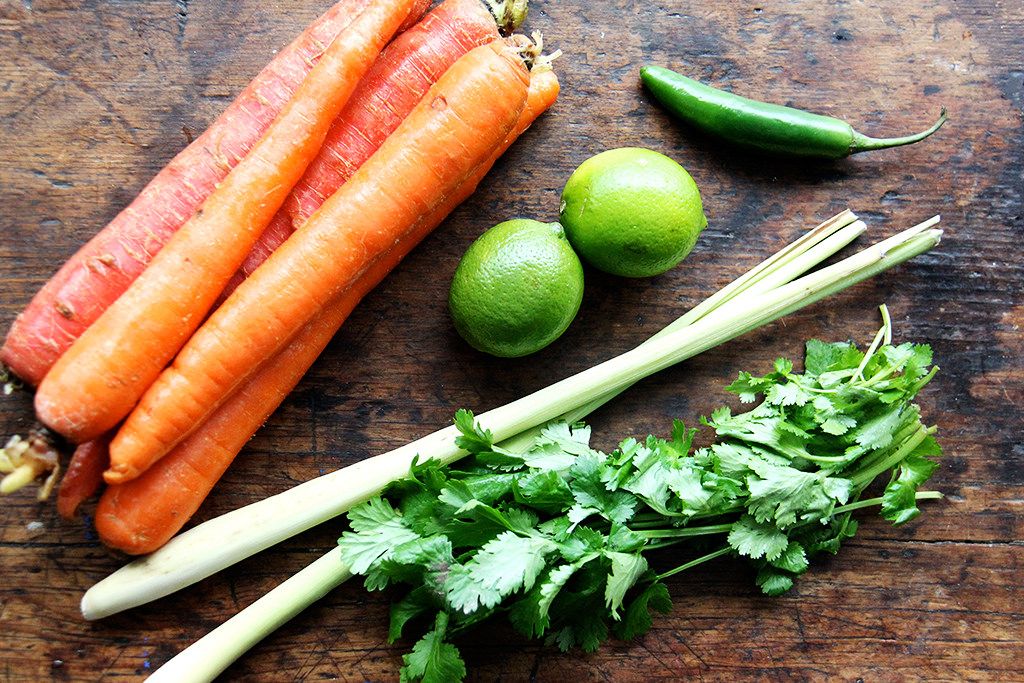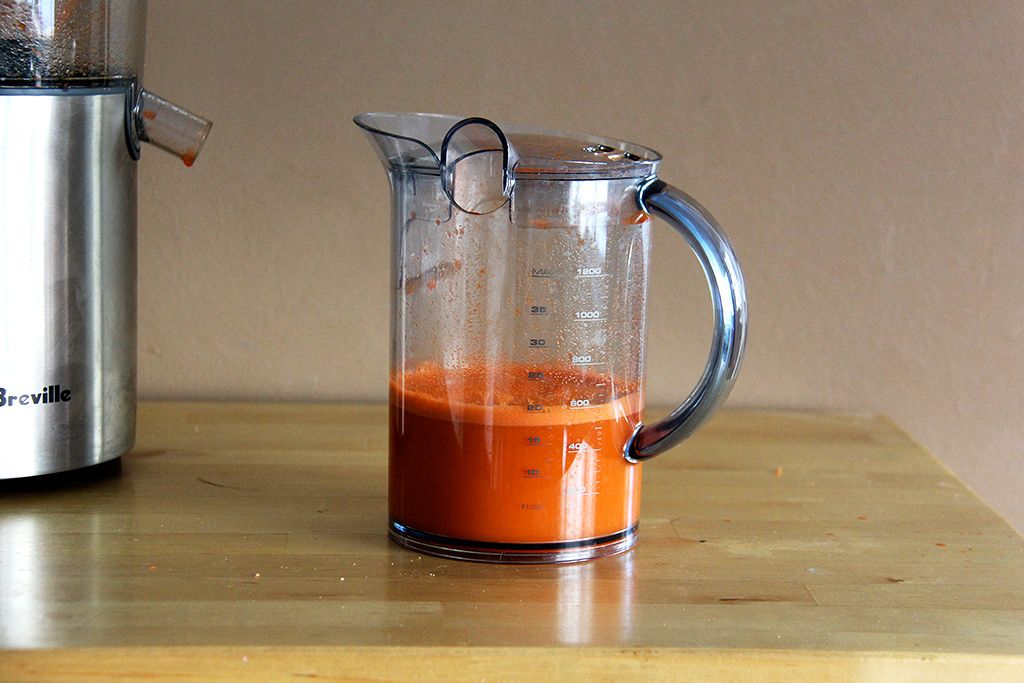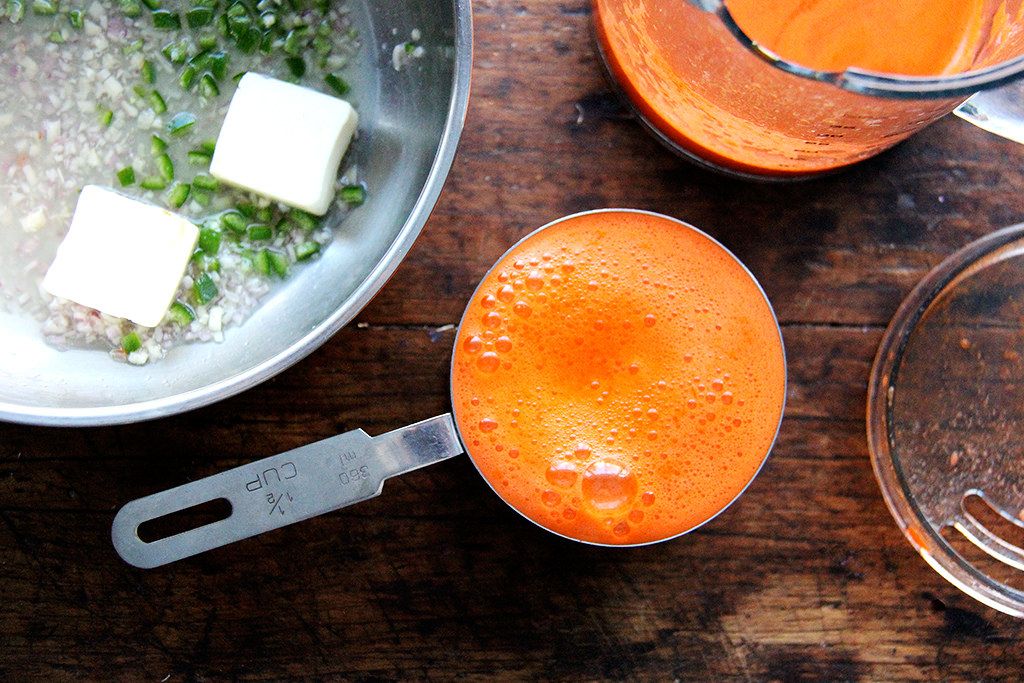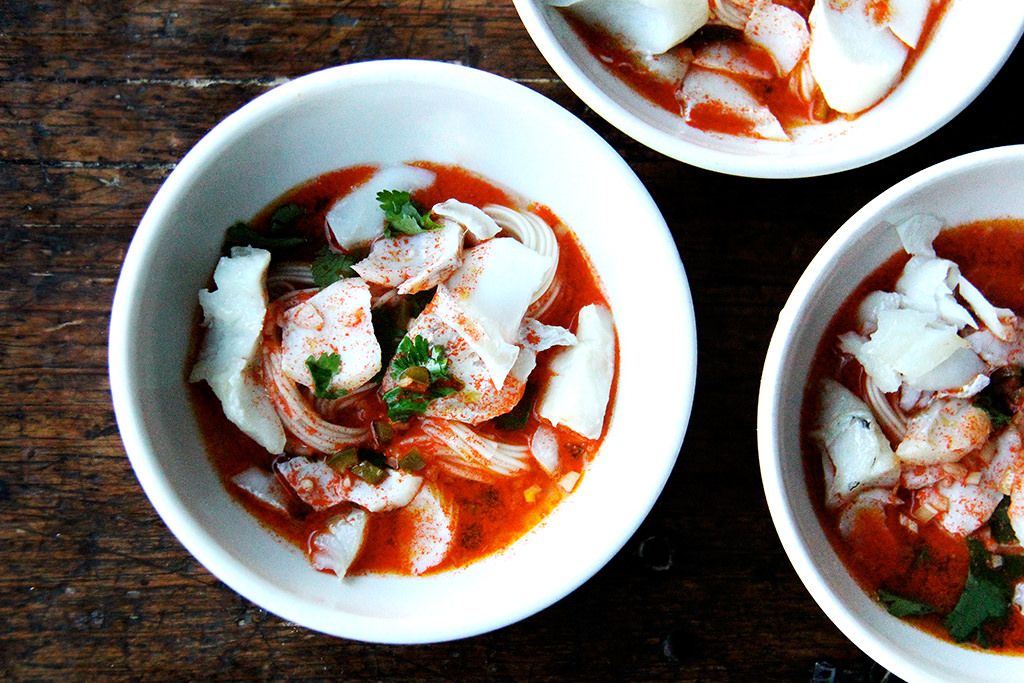Winter is coming and we're serious about keeping farmers market produce on the menu. Alexandra Stafford of Alexandra Cooks shows us how to store, prep, and make the most of it, without wasting a scrap.
Today: Carrots deserve more than their perennial role as a crudité. Here's how to store, prep, and serve this overlooked root—and how to make the best broth you've had this season.
I did not need another monstrosity of a gadget cluttering my countertop. I had no interest in a cleanse or in meal replacements. I have always believed in eating vegetables in their mostly recognizable state, raw or simply cooked with minimal seasoning.
But in the weeks leading up to Christmas, I rationalized my way into owning a juicer. In fact, I willed it to happen: I refused to visit my local co-op without ordering the “Sweet Sunset”—a $6 blend of beets, carrots, and apples—and without noting that owning a juicer would quickly pay for itself.

Besides, I would tell myself, thanks to my CSA, I have SO many perfect juicing vegetables on hand —what a great way to use up some of those tired looking beets and carrots. I even pulled out an old “Cook Like a Pro” article from Bon Appétit, which promised that making “the best sauce is as easy as juicing.” Who says juicers are unitaskers?
On and on I went till Santa couldn’t take it anymore and somehow snuck a gargantuan box under the tree. I put the juicer to work straight away and have since been welcoming each morning with some sort of “sweet sunset” concoction, and when I visit my co-op, I, smugly march right on past the juice bar.

Thus far the juicer has exceeded expectations, which I attribute mostly to its employment as broth maker and, in particular, to this Jean-Georges Vongerichten carrot broth recipe. It comes from The Chefs of the Times cookbook, a collection of recipes culled from 23 chefs who offer insight on the inspiration behind each of their recipes.
In the preface to his “Scallops in Carrot Broth” recipe, Vongerichten explains that in response to a sauce-phobic customer base in the 1980s, he began moving away from using stocks for sauces, turning instead to vegetable juices. Wanting something nearly raw, simple, and fresh, he seasoned carrot juice with lemongrass, limes, and chilies -- flavors he discovered while working in Bangkok -- then finished it off with roughly chopped mint and cilantro.
I followed the recipe to a T the first time around, serving the broth in shallow bowls with pan-seared scallops. The contrast of the brilliant orange against the white of the scallops and the green of the herbs made for a restaurant-worthy presentation, and I made sure to savor it all with a spoon—each mouthful contained both scallop and broth, something Vongerichten insists on. But the broth, with its bright, sharp, spicy flavors evoking many a Southeast Asian soup made me want to cup that bowl with my hands, lift it to my face, and slurp it down like morning cereal milk.

Maybe it’s the chilly weather, but I prefer using this broth in less elegant presentations, with ingredients that better assume the flavor of the broth. Somen noodles and flaky white fish like haddock so nicely absorb the flavor of the lemongrass, lime, and chile. This soup could certainly be made vegetarian, too—tofu and mushrooms would be great additions—but any number of ingredients could work, especially those with spongey textures.
Made with few ingredients, this broth takes no time to throw together if you own a juicer. I am by no means trying to convince any of you to buy one, but if you're curious about using juice as broth, I suggest buying fresh carrot juice from a juice bar or health food market—1 1/2 cups is all you need.

Some General Carrot Advice—Choosing and Storing:
- Carrots should feel firm to the touch. Avoid carrots that feel flimsy or that have soft spots or cracks. If you buy carrots with the tops still attached, the greens should look bright and fresh. Remove the greens before storing the carrots—they'll keep longer when separated from their greens.
- If you have space in your fridge, store carrots in a plastic, perforated, or open bag in your vegetable bin. Avoid storing carrots near apples or pears because the ethylene in these fruits can cause the carrots to spoil. If you don’t have space in your fridge, a cool basement or closet will work, too.
How to Prep Carrots:
- The first carrots of the season (those harvested in the spring and summer) do not need to be peeled—just wash them well and proceed with your recipe or eat them raw.
- Late-season carrots (those harvested in fall), whose skin can be bitter, sometimes benefit from being peeled, though they don’t have to be—taste one before peeling. If your carrots are dirty, wash them well before using.
More Ways to Eat Carrots:
Raw:
Boiled or steamed:
- Most simply, boil carrots until tender, then dress with butter, salt, and any number of fresh herbs: parsley, dill, chives, thyme, mint, or cilantro. Or, after boiling, toss carrots with harissa, preserved lemon, olive oil, vinegar, and cilantro for a Moroccan salad that tastes better by the day.
Stovetop:
- Make a fast but elegant side dish: Cut carrots into batons, toast cumin and coriander seeds, sauté carrots with the toasted spices and a little butter and oil, then dress with maple syrup and cook until the carrots are fork-tender and caramelized.
- Or, braise sliced carrots on the stovetop with butter, salt, thyme, and water for 15 minutes, then uncover and continue cooking until the liquid has reduced and a syrupy glaze coats the carrots.
Soups and stocks:
Baked:
Pickled:
- Carrots, on their own, make great pickles, but when julienned and combined with cucumbers and daikon radish, they make a great addition to any sandwich, báhn mì in particular.
Additional Recommendations From The Editors:
I love to pull out this recipe when I have an abundance of carrots because it utilizes the whole vegetable, top to bottom. The carrots get roasted simply and quickly on high heat, their frilly blended into a glorious, verdant pesto. The whole dish is crowned with rich, creamy burrata cheese.
Looking to spice up your roasted carrot routine? These carrots are spicy, smokey, sweet and perfectly balanced. Author Dorie Greenspan writes that they are, "Good hot, at room temperature or cold, making them as right for dinner as for a summer picnic."
When rubbed with BBQ seasoning and slow-roasted, carrots take on a certain meaty, deeply savory quality and shine as a vegetarian main. They would be great on their own, but they’re even better when served alongside smoky beans and crunchy pickliz, a Haitian condiment made from pickled cabbage, bell pepper, Scotch bonnets, and even more carrot.
This creamy gratin introduces sliced carrot in addition to the traditional potato for a flavor twist without sacrificing any of the comfort. Fresh thyme brings wintry flavor to this gratin, though it’s welcome on my dinner table regardless of the season.
Try adding carrot to your morning routine. This smoothie has orange juice, ginger, and a hint of cardamom for flair, but its thicker texture isn’t your thing, you can always strain this to drink as a juice.
These sticky-sweet bars inspired by Gajar Halwa are somewhere between carrot cake, blondies, and English pudding. Super-moist and full of spice, these bars are the perfect treat to surprise carrot cake lovers in your life.
Here’s a perfect recipe if you’re all carrot-ed out but still have more to use. This chocolate “snacking cake” hides an impressive amount of shredded carrots (2 1/2 cups worth, to be exact!) And the carrots don’t just add nutrition—they create a moist, delicate crumb, too. Plus, it still satisfies any and all cravings for tangy cream cheese frosting.
Photos in article by Alexandra Stafford.
What do you like to make when you have too many carrots? Share your favorite recipes in the comments!






See what other Food52 readers are saying.